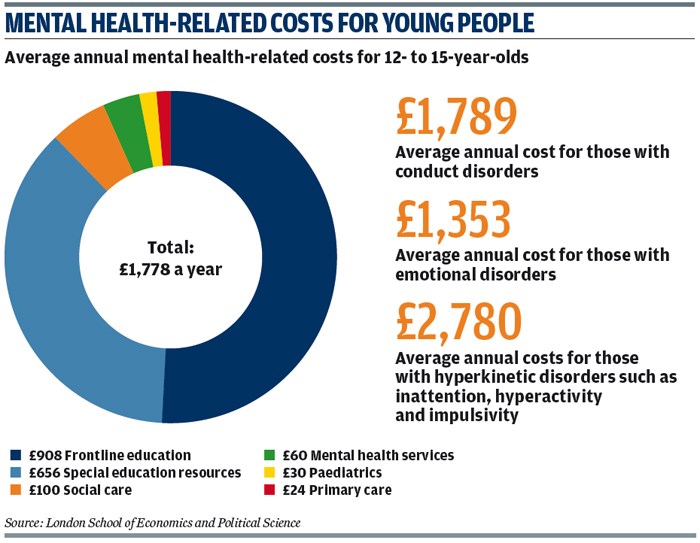Youth Mental Health: New Economic Evidence
Charlotte Goddard
Tuesday, April 12, 2016
Study of the economic impact of youth mental health services in the UK.
Authors
Martin Knapp, Vittoria Ardino, Nicola Brimblecombe, Sara Evans-Lacko, Valentina Iemmi, Derek King, Tom Snell, Silvia Murguia, Henrietta Mbeah-Bankas, Steve Crane, Abi Harris, David Fowler, Joanne Hodgekins, Jon Wilson
Published by
London School of Economics and Political Science, January 2016

Summary
A team from the Personal Social Services Research Unit at the London School of Economics and Political Science analysed data from the British Child and Adolescent Mental Health Survey, a survey of 2,461 children and young people, and the 2000 Adult Psychiatric Morbidity Survey.
The team found mental health-related costs for 12- to 15-year-olds totalled an average of £1,778 a year. Ninety per cent of this cost was incurred by the education sector. The cost was broken down as £24 for primary care, £30 for paediatrics, £60 for mental health services, £100 for social care, £908 for frontline education and £656 for special education resources.
Young people with hyperkinetic disorders such as inattention, hyperactivity and impulsivity incurred the highest average cost per year at £2,780. Average annual costs were £1,789 for 12- to 15-year-olds with conduct disorders and £1,353 for those with emotional disorders.
More than half - 55 per cent - of children and young people with mental health issues had no contact with services in relation to their mental health needs. The proportion was particularly high among 16- to 25-year-olds at 64 per cent. Even among those 16- to 25-year-olds with a severe mental illness, nearly half - 46 per cent - were not receiving mental health services, the lowest rate of contact with specialist services out of all age groups. When mental health issues go unrecognised and untreated, symptoms may worsen, requiring much more expensive treatment when they are eventually spotted.
The authors also found young people between the ages of 16 and 25 with mental health issues were significantly more likely not to be in employment, education or training than those without such issues - 27 per cent compared with 16 per cent. Young people with mental health issues were also significantly more likely to be on welfare benefits than those without mental health issues - 27 per cent compared with 14 per cent. Young people with a mental health issue when they were first surveyed were eight times more likely to have contact with criminal justice services 18 months later. This all represents an economic cost to society.
Implications for practice
The report authors say neglecting mental illness in young people is not only morally unacceptable, but also an enormous economic mistake. They call for early investment in projects that aim to prevent or reduce the risk of mental health issues emerging during childhood and adolescence, such as anti-bullying projects in schools.
They also say there should be earlier recognition and a better response for those young people who do experience mental health issues, more funding for child and adolescent mental health services and an increase in collaboration between different agencies, such as youth justice, education and health.
Read the full report: Youth Mental Health: New Economic Evidence
Further reading
- The UK National Evaluation of the Development and Impact of Early Intervention Services (The National EDEN Studies): Study Rationale, Design and Baseline Characteristics, Max Birchwood and others, Early Intervention in Psychiatry, February 2014. A national study of young people receiving care from early intervention services.
- The Economic Impact of Early Intervention in Psychosis Services For Children and Adolescents, Paul McCrone and others, Early Intervention in Psychiatry, November 2013. A report finding that early intervention services for children and adolescents with psychosis provide potential direct health cost savings comparable to those observed for working-age adults.
- Annual Report of the Chief Medical Officer 2012, Our Children Deserve Better: Prevention Pays, Sally Davies and others, October 2013. Chapter 10 looks at mental health problems in children and young people.




